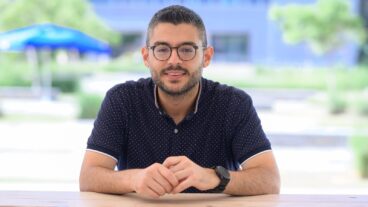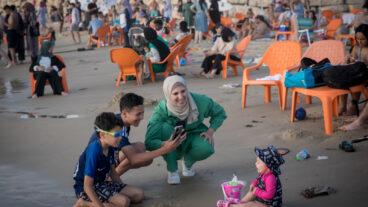The heartrending story of Dr. David Applebaum, and his daughter Nava, who lost their lives sharing a moment together in Café Hillel in Jerusalem on the eve of her wedding, is a story that will not soon be forgotten.
But in the Israeli medical community, Applebaum will be remembered for what he achieved his life rather than the fact that he was killed in a suicide bombing.
Applebaum was raised in Detroit, educated in Cleveland, and immigrated to Israel in 1981. The head of Jerusalem’s Shaare Zedek Medical Center’s emergency department at the time of his death, he single-handedly revolutionized emergency care in Israel using his American know-how. In turn, he then brought his Israeli-acquired knowledge back to American hospitals.
His innovations transformed the way Israel approached emergency medicine – which has been recognized officially as a medical specialty only two decades ago in the US and a year ago in Israel – not only at Shaare Zedek, but for hospitals around Israel as well.
Just before he was killed, Applebaum returned from New York City, where he delivered an address on managing the medical response to mass casualty events at a major downtown symposium on emergency preparedness at an event memorializing the Sept. 11 terror attacks. A spokesman for NYU Downtown Hospital, which is located four blocks from ground zero, said Applebaum had been a main presenter at its disaster preparedness symposium. It said the symposium was the first step in a new relationship between the hospital and Shaare Zedek, with exchanges of information, ideas, training and education on disaster preparedness and incident management.
“Everyone at NYU Downtown Hospital is simply devastated by this terrible loss,” NYU Downtown Hospital said in a statement. “Dr. Applebaum’s example will serve as an inspiration.”
“That he would accept an invitation to speak in New York three days before his daughter’s wedding, and then take the first plane back after his speech and make the time to sit and talk with his daughter the night before her wedding – it just shows the way he was able to give 100% to both his work and his family life without neglecting either,” said Shaare Zedek director-general Prof. Jonathan Halevy.
Applebaum was so devoted to his work that, when he failed to arrive at the hospital immediately following the attack to treat the victims of the Café Hillel bombing, his staff already feared the worst.
While victims of the attack were treated with the hospital’s usual efficiency, an unusual quiet reigned, punctuated only by low voices. When the bitter news was received, staff members continued to work, but were unable to hold back their tears. They kept working because they knew that was how their chief would have wanted it.
A quick looks at Applebaum’s achievements would include lots of ‘firsts.’ He and his staff were the first in Israel use of computers to keep track of ER patients, their tests and conditions; he streamlined the triage and treatment process to minimize the queue, and he developeda cadre of doctors who could cope with nearly every emergency instead of waiting for specialists in the wards to come down when they have time.
Before coming to Shaare Zedek, Applebaum had already pioneered one revolution: he introduced the concept of private urgent medical care clinics in 1988 with the opening of his first Terem center in Jerusalem’s Magen David Adom building. Additional Terem centers were created in other parts of the country, and Applebaum remained at the helm of Terem even after accepting the position at Sha’are Zedek.
Bringing the old hospital into the modern age, he worked hard to improve efficiency and reduce waiting time. He introduced large computerized device, something like a digitized scoreboard that stores and displays this information in real time. This is hooked up to the computer system so relevant staffers, given access by code, can determine the status of any emergency room patient immediately.
Shaare Zedek director-general Halevy called the innovations that Applebaum introduced “a revolution.”
Applebaum inspired dedication from the doctors who worked under him and expected no less for himself. He was on 24 hour call seven days a week, including Shabbat, when in real emergencies the observant Jew walked briskly to the hospital from his home in the Kiryat Shmuel neighborhood. When he was out of the hospital, he continued to monitor the treatment of each patient via a computer connection, even when he was abroad.
Applebaum believed deeply in an interdisciplinary approach in the ER. Applebaum taught all doctors in the ER to perform tracheotomies, insert chest tubes and central lines, and resuscitate patients.
“We have initiated protocols so that physicians can feel comfortable handling a wide range of clinical cases,” he told The Jerusalem Post three months ago. “For example, when a patient comes in with a suspected diagnosis of kidney stones, until recently they have had to wait in pain for some time. We have formulated guidelines so that any doctor in the ER can diagnose and give immediate pain relief for kidney stones. We are also working on improving the communications and social skills of our staff; we want them to have a better bedside manner, despite the pressure.”
“He changed the face of this department, and at the same time he was an amazing human being. As soon as he arrived each day, he would go around wishing everyone ‘good morning, staff members and patients alike,” said nurse Simcha Hacohen after learning of his death. “I feel as if we’ve been orphaned.”
There was terrible irony in the fact that a man who had done so much to save other terror victims – and was often the first to arrive at the scene of attacks – died as a result of terrorism. In 1986, Applebaum was presented with an award by the Knesset after treating terror victims at the scene of an attack on King George Street in Jerusalem while firing was still continuing.
As well as being a specialist in emergency medicine, Applebaum, father of six, was also an ordained rabbi, and continued to find the time to present lectures in Jewish law at a local seminary.
At a funeral attended by thousands, former chief rabbi Yisrael Meir Lau extolled Applebaum’s integration of a religious life with life-saving medical activities. “He was one of God’s emissaries, and his mission has been cruelly ended,” he said.
“He was one of the ’36 righteous men’ of the world,” his youngest son Natan said at his funeral. “His whole life was dedicated to saving lives.”
The hospital staff spoke of Appelbaum as having an outstanding personality, as a man who was intrinsically kind.
“Thousands of Jerusalemites owe their lives to him,” said Halevy. Other colleagues spoke of a “great Torah scholar,” a “sparkling personality,” and a “model family man.”
By giving of himself and his knowledge to his countrymen – both in Israel and the United States – Applebaum was a shining example to both peoples.












